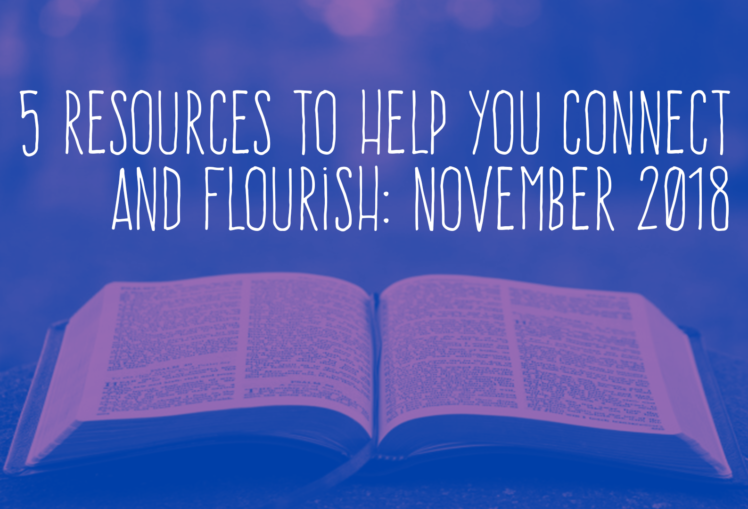Blog

5 Resources to Help You Flourish: November
November 30, 2018
Reservoir exists to help people connect with Jesus and flourish. We think the right church can be a good part of that happening, so we enjoy being a church that can help you discover more of the love of Jesus, the gift of community, and the joy of living. But we’re also aware that there’s a lot more to a flourishing life than church and that at any given time, church isn’t for everyone.
So each month, we’re sharing a few resources we’ve been enjoying and finding contribute to a flourishing life for us. I hope you enjoy some of these resources for your own flourishing life. If you have ideas for things we should include in future lists, send them to me at steve@reservoirchurch.org with the subject “Top 5” in your message.
- I’ve plugged this podcast before, but I am really thankful for Jared Byas and Pete Enns’ show, The Bible for Normal People. I’m sure it’s the only podcast of which I’ve listened to every single episode. That says something about me – I love the Bible and honest, insightful voices that help me think about the Bible differently. But it says something about the podcast as well. The most recent episode had a great New Testament scholar, Daniel Kirk, walking us through some great insights on the gospel of Mark. I’ve also been introduced there to womanist scholars (the reading of in this case, The Bible, through the lens of the experience of Black women), Jewish and Christian Old Testament scholars and archaeologists, and figures from popular Christian culture who have reevaluated their perspective on the Bible, or found new ways to engage with it over time.
- This past month, I watched two very different films that moved me and drove me to prayer. One is The Hate U Give, the adaptation of Angie Thomas’ young adult novel. It’s a movie that is about police shootings of unarmed Black men but also about love and fatherhood and racism and coming of age and much more. My teenage and preteen sons gave it rave reviews, as do I.
- The other film is a bit older, but it’s streaming on Amazon and elsewhere. It’s The Long Green Line, a documentary about one season in the life of one of the greatest coaches of our time, high school cross country coach Joe Newton, who passed away last year. Newton won 26 state championships over his long career, but this film isn’t just about the admittedly niche subject of high school cross country (interesting to me right now, as my daughter has been emerging as a pretty darn good cross country runner!). It’s about coming of age and about what mentoring and encouragement and inclusion look like, and how powerful it is when grownups offer these things to teens.
- My local library had a display this month of fiction by Native American authors. The title I checked out, and really enjoyed, was Sherman Alexie’s collection of short stories, Ten Little Indians. The nine stories all feature Native American protagonists who are, amongst other things, coming to terms with their identity. Two that particularly resonated for me were the story of a young woman wondering if every life might be epic, and the tale of a middle-aged man looking for a second act past the the death of his parents and his life’s disappointments.
- Speaking of identity, current events in our country, and some media, and this upcoming Christmas season all have me thinking about how we wrestle with our own identities and the stories we tell about ourselves. As we’ve continued to witness shootings of unarmed Americans, including by police, and the tear-gassing of asylum seekers at the Mexican border, many Americans have been asking if this is the kind of country we are. The simple, if somewhat cynical answer, is yes – these events have long and deep roots in our bitter history. And yet for most of us, they aren’t part of the country we want to become. Can we embrace a better identity, a new story for ourselves?
Hidden Brain’s Shankar Vedantam recently interviewed historian Annette Gordon-Reed discussing the contradictions at the heart of Thomas Jefferson’s complex identity and place in history. Jefferson penned the famous words “All men were created equal,” which have inspired Lincoln and King and others to advance freedom and universal human rights, and yet he owned slaves, including his long-standing concubine, Sally Hemmings. It seems Jefferson understood himself to be a progressive man, but in his optimism in inevitable human progress, he backed out of his own responsibilities to see that progress through. Part of Jefferson’s identity was “progressive man”, but part was also “man who’s entitled to dominance over his lover and the workers in his household.” These complicated contradictions of idealism and belief in progress right alongside entitlement and lack of self-awareness run through the fabric of American democracy and of most of us who live in this country as well.
Some of my favorite stories involve this theme of the power of our construction of our own identity, and the power of the stories we come to tell about ourselves.
As Christmas comes, I find myself asking questions about identity. Are we mainly vulnerable and alone in the world or is God profoundly with us now? Are we free agents, shaping our own futures, or are members of God’s family, citizens of God’s kingdom, seeking to find the way of Jesus in our private and public lives? Does our disappointment or our hope speak louder to us?
May Jesus shape a better and better story for you this Christmas season, my friends.

